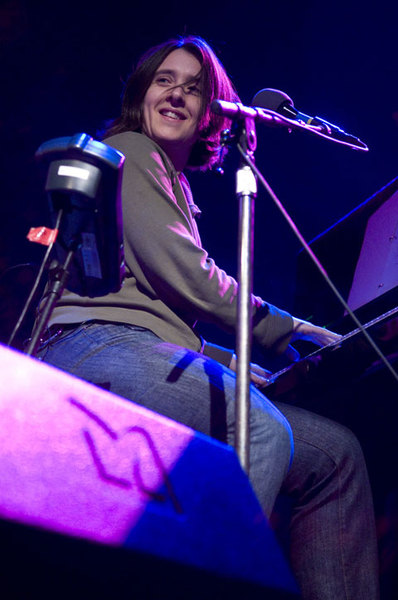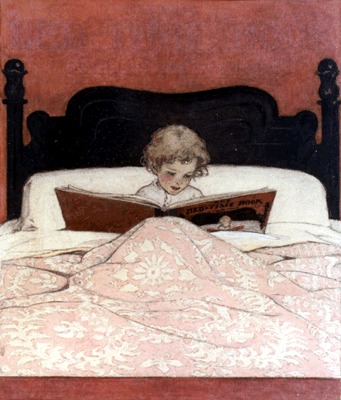If there’s a more literate band than The Magnetic Fields, I’d like to know what it is. But Strange Powers (the new documentary about the band, which I’ve just written about) is much more focused on Stephin Merritt’s reading than on Claudia Gonson’s. I wanted to know what kinds of things Gonson had read, and when. So I wrote and asked her (we’ve never met, but have friends in common). Here is her response. — Dan Chiasson
Caveat: I am nursing a 2 month old baby right now, so remembering anything, like what I ate for breakfast today, has become very difficult. Remembering what I have read throughout my life is going to be pretty much impossible, but what the hell. Here goes.
I don’t have a great recollection of my reading before about 12, but my childhood room is amazingly still there and when I go back to Cambridge I sit and gaze at the most wonderful books, like Andrew Lang’s Fairy Books and all those pre-teen girl titles like Julie of the Wolves and Island of the Blue Dolphins, etc. etc. One of my favorites from early days was Jacob Two-Two and the Hooded Fang, about a kid who said everything twice, and it turned out to be his super power. I also read Judy Blume, yes it’s true.
The big book of my early days, probably starting around 10, was At the Back of the North Wind by George MacDonald. It was an early-20th-century edition (first?) with beautiful plated illustrations by Jesse Wilcox Smith, one of those amazing turn-of-the-century illustrators. I took it out of the Public Library in Cape Cod each August, until one summer (probably around my 12th or 13th), they announced that it was officially an antique and thus “rare book,” and had to remain behind glass. So my sainted mother went to an auction and bought me my own version of that exact edition, which I still own. The book is basically the story of a young boy dying of TB in a drafty old barn above the horses. A good Victorian tale. He ends up being taken “home” by the lovely North Wind, who (like me at the time) had extremely long dark hair. She wrapped him in her hair. I didn’t think about it so much till later, but of course this was a book that I read to come to grips with death.
At around 11 or 12, I became completely obsessed with reading, probably because I was in a hormonal shit storm and couldn’t deal with human beings. My recollection of my 6th grade year is spending each day with my head on my desk. After school, I went to the fantasy section of the Cambridge Public Library and sat on the floor, piling through each title; Susan Cooper’s The Dark is Rising series, which I read several times, Lloyd Alexander’s various books like Taran Wanderer, some series about dragons which I am blanking on, Ursula Le Guin, Madeleine L’Engle, Narnia, etc.
This is relevant because about 20 years later, when I was in my 30s, I became re-obsessed with fantasy. It began with meeting Neil Gaiman, but I think it was also just sort of high time. Many women start thinking biological thoughts in their 30s, and I wonder if I was needing to return to my own childhood feelings for that reason, or another reason. But I spent a good many years jumping back into fantasy, soaking up Diana Wynne Jones and Terry Pratchett (Terry Pratchett is still my “anti depressant”), and Kelly Link and Neil Gaiman, and others. Fantasy films and science fiction also have dominated my adult life. It’s convenient that my resurgent interest in this genre happened right when the genre started getting super kick ass again, thanks to Harry Potter. But there are many great new fantasy writers for children, as there were in my youth in the late 70’s. Also I should make a shout-out to the animated filmmaker Hayao Miyazaki. Just because he’s amazing.
And while we’re talking about animation, that was the other thing that exploded for me around 2000, when I met Neil Gaiman and decided to revisit my childhood. I started reading a lot, lot, lot of comic books. I had a “dealer,” Douglas Wolk, who lived uptown, and we would meet every week or two and I’d hand him back his Love and Rockets or Swamp Thing or Cerebus or Jimmy Corrigan and borrow the next stack. I also piled through the greats of the early 90s, a tad late: Dark Knight and Watchmen and Sandman and various other Alan Moore and Frank Miller titles. I can’t say I’m a comics completist; in fact, I was rather catholic about it—I’d read the underground punk stuff and the mainstream DC stuff. I just wanted it all. That lasted a couple years and then I slowed down. But I still enjoy comics (and fantasy books); in my last couple months, along with the requisite million baby “how to” books, I have enjoyed Julia Wertz’s latest book, Drinking at the Movies. Comics are good for reading sporadically during breast feeds.
Advertisement
Okay, that was one thread. Now onto the academic thread. I’m sure I’m going to miss a lot here, so don’t take this as a complete listing. My academic life can be divided into “before Eve” and “during/after Eve.” This is the first Eve, Eve Sedgwick; my daughter is named after her, as she passed away in 2009. Before Eve, as an undergrad, I was really obsessed with Walter Benjamin and stuff like “speed theory,” Baudrillard and John Berger, thinking about how we process the environment. Thinking about Mediation. I was obsessed with Laurie Anderson and wrote my undergraduate thesis about her. Again, Mediation. For instance, in those early days in the 90s, if Stephin and I were on tour, we would look at a road sign indicating a tunnel and say “look, a tunnel,” rather than at the tunnel.
I was also very into Lord Jim for a year. That was 1995, when I went for a year to Berkeley for grad school in English. I read it many times, and I think I was supposed to write a paper on it but I got stuck. Going backwards by a decade, I remember loving to dissect Romantic poetry in my freshman year, and being really acutely obsessed with a John Donne poem, “Twickenham Garden.” Stephin and I talked about it for three hours on the phone and then the paper just emerged.
I guess if I had an era it would be Modernism, but I felt really conflicted about certain Modernist writers (as well as artists), because they were sexist dickheads. Sorry, I count James Joyce on this list, but haven’t read much outside of Ulysses, so maybe I’m totally missing the boat. Ulysses made me furious, but that was in the mid-90s. I could give it another whack. I did adore however: James, Conrad (sort of late romantic/early modern I guess), Stein, and of course my lovely, lovely Virginia Woolf, whom I was rather obsessed with in college. Oh, I forget that I was also obsessed with Faulkner in high school. (In fact, I sort of forgot to write at all about high school. Oh, well.)
I met Eve Sedgwick in 1998 by taking a year-long course reading the entirety of Remembrance of Things Past. That basically changed my life. She wasn’t wrong when she said that you need to pay attention when Proust gets that “wise” tone; he will teach you great things. You don’t need a shrink if you have Proust. I feel rather biblical about the Recherche. Eve said he’ll make you smarter, and in fact he (and she) made me smarter. Over the next 4 years at CUNY, I took everything Eve taught.
This academic sunburst with Eve coincided with that regressive leap back into the fantasy world of my childhood (although mostly reading current authors at that time), and the comics. So there was something very comforting and delightful about that. I also was enjoying, for the first time, intermingling my rock-life with my academic one. I had always felt a bit embarassed to tell my professors that I did the music thing, or my musician friends that I did the academic thing. But my CUNY years coincided with the success of my band, and suddenly it was all okay. I could go with Eve Sedgwick to see Kiki and Herb play at the Bowery, and then we’d talk about it in class, and then we’d read Terry Pratchett. If I’d only known this acceptance could exist a few years earlier, I’d have saved myself a lot of navel-gazing and psychological trauma.
Also at CUNY, I studied a bit with Wayne Koestenbaum. I had always loved Modernist literature, although like I said I was conflicted about the sexist dickhead aspect, and Wayne made my life much easier by cherry-picking all the most interesting and most queer, i.e. the ones who didn’t have that “I own the Universe” tone of voice. Like Jane Bowles, who is marvelous.
I should say that Faulkner and Stein, who I love, both have that “I Own the Universe” tone of voice. But maybe I’m over being angry about this stuff, and can enjoy Picasso again. Who knows. Feminism is important, but it also seems to strike women most aggressively in their 20s.
Advertisement
Let’s see, what else have I massively overlooked. Performance artists were incredibly important to me in the 80s (high school) and 90s (college); Rachel Rosenthal, Annie Sprinkle and Laurie Anderson more than Lydia Lunch or Karen Finley. I like intellectuals and happy people more than angry ones.
I feel like there’s unbelievably huge gaps in my list here, but what can you do. Shakespeare, for instance. He has been a major player. T.S. Eliot. Moby Dick. Maurice Sendak and Dr. Seuss (children’s literature in general). Ok, baby is crying. Thank you baby for sleeping an extra hour!
best
Claudia




